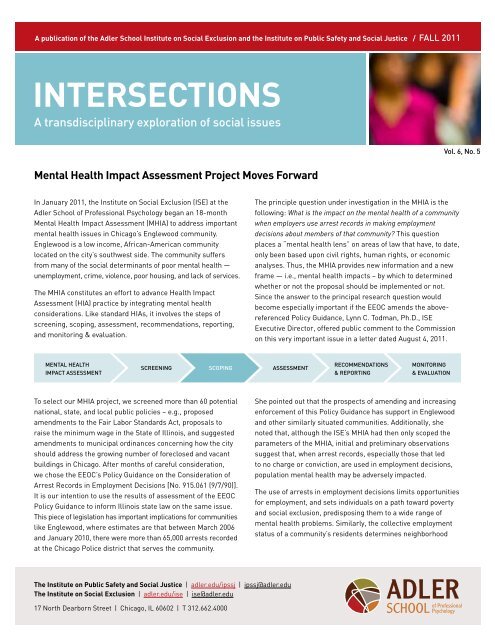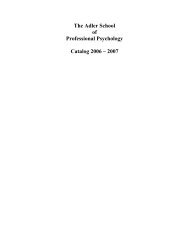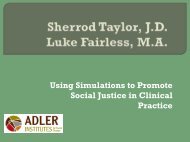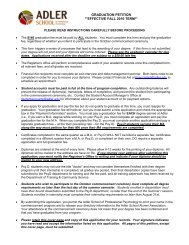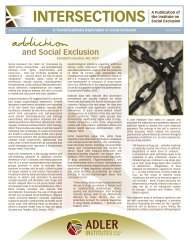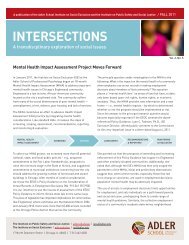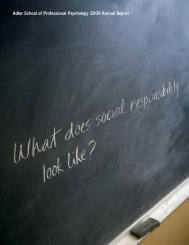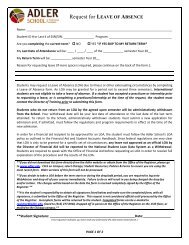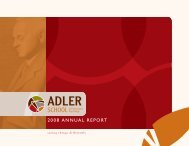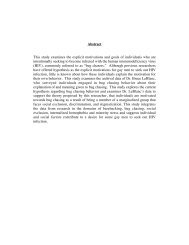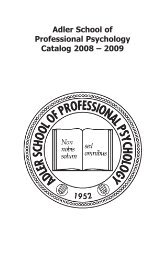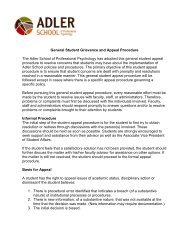Fall 2011 - Adler School of Professional Psychology
Fall 2011 - Adler School of Professional Psychology
Fall 2011 - Adler School of Professional Psychology
You also want an ePaper? Increase the reach of your titles
YUMPU automatically turns print PDFs into web optimized ePapers that Google loves.
A publication <strong>of</strong> the <strong>Adler</strong> <strong>School</strong> Institute on Social Exclusion and the Institute on Public Safety and Social Justice / <strong>Fall</strong> <strong>2011</strong><br />
Intersections<br />
A transdisciplinary exploration <strong>of</strong> social issues<br />
Mental Health Impact Assessment Project Moves Forward<br />
Vol. 6, No. 5<br />
In January <strong>2011</strong>, the Institute on Social Exclusion (ISE) at the<br />
<strong>Adler</strong> <strong>School</strong> <strong>of</strong> Pr<strong>of</strong>essional <strong>Psychology</strong> began an 18-month<br />
Mental Health Impact Assessment (MHIA) to address important<br />
mental health issues in Chicago’s Englewood community.<br />
Englewood is a low income, African-American community<br />
located on the city’s southwest side. The community suffers<br />
from many <strong>of</strong> the social determinants <strong>of</strong> poor mental health —<br />
unemployment, crime, violence, poor housing, and lack <strong>of</strong> services.<br />
The MHIA constitutes an effort to advance Health Impact<br />
Assessment (HIA) practice by integrating mental health<br />
considerations. Like standard HIAs, it involves the steps <strong>of</strong><br />
screening, scoping, assessment, recommendations, reporting,<br />
and monitoring & evaluation.<br />
The principle question under investigation in the MHIA is the<br />
following: What is the impact on the mental health <strong>of</strong> a community<br />
when employers use arrest records in making employment<br />
decisions about members <strong>of</strong> that community? This question<br />
places a “mental health lens” on areas <strong>of</strong> law that have, to date,<br />
only been based upon civil rights, human rights, or economic<br />
analyses. Thus, the MHIA provides new information and a new<br />
frame — i.e., mental health impacts – by which to determined<br />
whether or not the proposal should be implemented or not.<br />
Since the answer to the principal research question would<br />
become especially important if the EEOC amends the abovereferenced<br />
Policy Guidance, Lynn C. Todman, Ph.D., ISE<br />
Executive Director, <strong>of</strong>fered public comment to the Commission<br />
on this very important issue in a letter dated August 4, <strong>2011</strong>.<br />
Mental Health<br />
impact assessment<br />
screening<br />
scoping<br />
assessment<br />
recommendations<br />
& reporting<br />
monitoring<br />
& evaluation<br />
To select our MHIA project, we screened more than 60 potential<br />
national, state, and local public policies – e.g., proposed<br />
amendments to the Fair Labor Standards Act, proposals to<br />
raise the minimum wage in the State <strong>of</strong> Illinois, and suggested<br />
amendments to municipal ordinances concerning how the city<br />
should address the growing number <strong>of</strong> foreclosed and vacant<br />
buildings in Chicago. After months <strong>of</strong> careful consideration,<br />
we chose the EEOC’s Policy Guidance on the Consideration <strong>of</strong><br />
Arrest Records in Employment Decisions [No. 915.061 (9/7/90)].<br />
It is our intention to use the results <strong>of</strong> assessment <strong>of</strong> the EEOC<br />
Policy Guidance to inform Illinois state law on the same issue.<br />
This piece <strong>of</strong> legislation has important implications for communities<br />
like Englewood, where estimates are that between March 2006<br />
and January 2010, there were more than 65,000 arrests recorded<br />
at the Chicago Police district that serves the community.<br />
She pointed out that the prospects <strong>of</strong> amending and increasing<br />
enforcement <strong>of</strong> this Policy Guidance has support in Englewood<br />
and other similarly situated communities. Additionally, she<br />
noted that, although the ISE’s MHIA had then only scoped the<br />
parameters <strong>of</strong> the MHIA, initial and preliminary observations<br />
suggest that, when arrest records, especially those that led<br />
to no charge or conviction, are used in employment decisions,<br />
population mental health may be adversely impacted.<br />
The use <strong>of</strong> arrests in employment decisions limits opportunities<br />
for employment, and sets individuals on a path toward poverty<br />
and social exclusion, predisposing them to a wide range <strong>of</strong><br />
mental health problems. Similarly, the collective employment<br />
status <strong>of</strong> a community’s residents determines neighborhood<br />
The Institute on Public Safety and Social Justice | adler.edu/ipssj | ipssj@adler.edu<br />
The Institute on Social Exclusion | adler.edu/ise | ise@adler.edu<br />
17 North Dearborn Street | Chicago, IL 60602 | T 312.662.4000<br />
page 1
conditions (a social determinant) which, in turn, impacts mental<br />
health outcomes. For instance, high rates <strong>of</strong> unemployment<br />
have deleterious impacts on “social capital”, “psychological<br />
sense <strong>of</strong> community” and, as a consequence, on the collective<br />
mental health and well-being <strong>of</strong> communities which may<br />
manifest high rates <strong>of</strong> mental health services utilization,<br />
substance abuse, depression/anxiety, and family violence.<br />
Even when employers do not wrongly apply the current EEOC<br />
guidance, this policy may produce adverse unintended effects on<br />
marginalized populations. Believing that it is lawful for<br />
employers to inquire about arrest records, members <strong>of</strong> legally<br />
protected minority groups may forego applying for available jobs<br />
because they are under the false impression that employers are<br />
well within their rights to inquiry about arrest records and are<br />
unlikely to hire someone with an arrest record – even if that<br />
arrest did not result in a charge or conviction. In this way, the<br />
current policy, as understood by potential job seekers, may well<br />
have a “chilling” effect among people who most are in need <strong>of</strong><br />
employment and its benefits (e.g., health insurance).<br />
At this time, the scoping phase <strong>of</strong> the MHIA project has been<br />
completed. During this phase, the ISE team formulated a<br />
series <strong>of</strong> research questions to guide the assessment process;<br />
identified health impacts to be considered; research<br />
methodologies; data sources; the demographic, geographical<br />
and temporal boundaries for impact analysis; and developed<br />
a work plan to guide the assessment process. Presently,<br />
we are engaged in the early portion <strong>of</strong> the assessment phase,<br />
collecting data from focus groups, community surveys, and<br />
interviews. That data will be used to determine the mental<br />
health implications <strong>of</strong> the proposed revision to the<br />
aforementioned EEOC Policy guidance. The results <strong>of</strong> the<br />
assessment will be used to develop the MHIA recommendations<br />
regarding the proposed policy revision and will be reported out<br />
to various stakeholder interests including Englewood residents,<br />
public <strong>of</strong>ficials, legislators and others.<br />
The MHIA project has been funded, in part, by the Robert Wood<br />
Johnson Foundation and the W.K. Kellogg Foundation. As<br />
described elsewhere in this newsletter, additional funding has<br />
recently been awarded by the Pierce Family Foundation.<br />
in the News<br />
Expert Testifies on Mental Health Dangers <strong>of</strong> Vacant Houses<br />
On Wednesday, July 20, <strong>2011</strong>, Dr. Lynn Todman, Executive<br />
Director <strong>of</strong> the <strong>Adler</strong> <strong>School</strong>’s Institute on Social Exclusion (ISE),<br />
testified before the Chicago City Council Joint Committee on<br />
Housing and Real Estate and Zoning, Landmarks and Building<br />
Standards which was examining proposed changes to the city’s<br />
Vacant Buildings Ordinance. Dr. Todman, a trained urban<br />
planner and a member <strong>of</strong> the city’s Community Development<br />
Commission, spoke in support <strong>of</strong> Amendment <strong>of</strong> Chapter 13-12<br />
<strong>of</strong> Municipal Code concerning maintenance and security <strong>of</strong><br />
vacant foreclosed housing in Chicago. Proposed amendment<br />
would require designate banks as owners <strong>of</strong> the properties<br />
their foreclose on and increase fees for registering vacant<br />
properties with the city’s and fines for non-compliance to<br />
requirements to pays fees and to maintain and secure their<br />
foreclosed properties.<br />
Dr. Todman was interviewed by WBBM Radio Chicago regarding<br />
her testimony. She explained that the ISE had conducted an<br />
assessment <strong>of</strong> the likely effects <strong>of</strong> the proposed ordinance<br />
change on the mental health <strong>of</strong> the residents <strong>of</strong> the Englewood<br />
community. The City Council passed the amendment into law<br />
on July 28. Most recently, in October the Council weakened the<br />
legislation under pressure from the banks.<br />
To learn more, go to: http://chicago.cbslocal.com/<strong>2011</strong>/07/20/<br />
expert-to-testify-on-dangers-<strong>of</strong>-vacant-houses/<br />
page 2
Institute on Public Safety and Social Justice (IPSSJ) Initiatives<br />
The Institute on Public Safety and Social Justice (IPSSJ)<br />
promotes social justice and public safety by increasing civic<br />
engagement and community control <strong>of</strong> safety issues. The IPSSJ<br />
uses socially responsible research, education, and community<br />
engagement to strengthen communities, systems, and the<br />
practices <strong>of</strong> institutions responsible for education and<br />
rehabilitation. There are many exciting initiatives at the IPSSJ,<br />
including the Restorative Justice Comparative Study, The<br />
Year <strong>of</strong> the Immigrant Series, and ACHS Program Summary<br />
and Evaluation.<br />
Restorative Justice Comparative Study<br />
The IPSSJ is collaborating with the <strong>Adler</strong> <strong>School</strong> Vancouver<br />
campus in a comparative study <strong>of</strong> Restorative Justice (RJ)<br />
practices in Chicago and Vancouver, B.C. Political discourse in<br />
the U.S. is dominated by themes <strong>of</strong> fiscal austerity, and yet the<br />
2010 budget for the Illinois Department <strong>of</strong> Corrections was<br />
$1.22 billion and the recidivism rate for the state is over 50%.<br />
Mass incarceration is both costly and largely ineffective in truly<br />
rehabilitating <strong>of</strong>fenders, yet tough on crime approaches and big<br />
spending on incarceration are deeply ingrained in our political<br />
and judicial systems. Restorative Justice (RJ) is a philosophy<br />
<strong>of</strong> practice that seeks to repair the harm done by an <strong>of</strong>fense<br />
through processes such as peace circles and conflict mediation,<br />
which <strong>of</strong>ten take place in community-based settings rather than<br />
corrections. Restorative practices <strong>of</strong>fer a potential alternative<br />
to costly corrections spending, and have been shown to be<br />
more effective in reducing recidivism and increasing victim<br />
satisfaction for some <strong>of</strong>fenses. Research on the effectiveness<br />
<strong>of</strong> individual programs using restorative practice has been<br />
promising, yet such practices are far from mainstream in the<br />
U.S. Meanwhile, restorative practices are more commonly used<br />
by justice systems in some Canadian provinces, providing an<br />
opportunity to learn from a comparative case study <strong>of</strong> Chicago<br />
and Vancouver, B.C. Over the next 6 months, the IPSSJ will<br />
be exploring how restorative practices differ in the two cities.<br />
The project seeks to inventory the various restorative practices<br />
happening in each city, and better understand how different<br />
programs interact with each other and formal justice system.<br />
The study seeks to better understand the complexities <strong>of</strong><br />
implementing successful restorative programs within two<br />
unique cities, justice systems, and political cultures. The project<br />
will culminate in the spring with a bi-campus presentation<br />
and dialogue about restorative practices and justice system<br />
reforms in both countries.<br />
The Year <strong>of</strong> the Immigrant Upcoming Events<br />
This year the Institute on Public Safety and Social Justice<br />
is launching a series to educate and mobilize the <strong>Adler</strong> <strong>School</strong><br />
community around the issue <strong>of</strong> immigration. This series is<br />
called the Year <strong>of</strong> the Immigrant. The first presentation in<br />
this series, “The Mental Health Implications <strong>of</strong> Being an<br />
Undocumented Student,” takes place Tuesday, November 1st<br />
from 3:30-5:00 p.m. in Community Hall on the <strong>Adler</strong> <strong>School</strong><br />
campus. We will invite mental health pr<strong>of</strong>essionals and<br />
community workers that are experts in immigration policy to<br />
come address this issue. The event is open to the public. There<br />
will be an <strong>Adler</strong> Action Day in conjunction with this effort that<br />
will <strong>of</strong>fer the opportunity to write letters about the federal<br />
DREAM Act to our Illinois Senators Mark Kirk and Dick Durbin.<br />
The second event will take place Thursday, December 8th<br />
from 3:30-5:00 pm. It is an opportunity to learn about mass<br />
deportation in the Chicagoland area and the effect it is having<br />
on families. Currently there are approximately 80,500 children<br />
in or around Chicago that have had at least one parent deported<br />
in the last five years. This trend in deporting massive numbers<br />
<strong>of</strong> individuals, the majority <strong>of</strong> whom possess no criminal<br />
record, is having a pr<strong>of</strong>ound effect on families, communities,<br />
schools, and detention facilities. Please join us for these two<br />
important dates in the Year <strong>of</strong> the Immigrant Series.<br />
St. Leonard’s Ministries/ACHS Program<br />
Summary & Evaluation<br />
There is a sign as you enter the Washington D.C. airport that<br />
says “Welcome to the United States: Home to 5% <strong>of</strong> the world<br />
population, and 25% <strong>of</strong> the world’s prisoners.” There is no doubt<br />
that the United States has incarcerated more people in the<br />
last thirty years that are now either cycling through the prison<br />
system over and over again, or whom are destined to search<br />
for non-existent employment while they try to rebuild their lives<br />
in the face <strong>of</strong> stigma and legislation that makes it difficult to<br />
work and move beyond prison.<br />
page 3
The <strong>Adler</strong> Community Health Services (ACHS) has been<br />
providing services to men and women getting out <strong>of</strong> prison for<br />
a number <strong>of</strong> years within a half way house setting. ACHS serves<br />
the men and women living at St. Leonard’s House and Grace<br />
House on Chicago’s Westside. These mental health services<br />
are key in aiding individuals leaving prison to rebuild their lives<br />
and their sense <strong>of</strong> hope, future, and family.<br />
This year the Institute on Public Safety and Social Justice<br />
(IPSSJ) will be summarizing and evaluating the work <strong>of</strong> ACHS<br />
for those living at St. Leonard’s and Grace House. It is hoped<br />
that this summary will provide a deeper understanding <strong>of</strong> the<br />
ways in which formerly incarcerated individuals need additional<br />
support and care to successfully avoid recidivism, and build the<br />
skills necessary to reintegrate into society.<br />
More specifically, the current endeavor is a full program review<br />
<strong>of</strong> all <strong>of</strong> the psychological services provided to St. Leonard’s<br />
House by ACHS. Currently, an evaluation is being designed to<br />
track key indicators <strong>of</strong> program effect. This will allow ACHS<br />
to redesign the program as necessary, and to manualize both<br />
program and corresponding training. This goal is to develop<br />
a full understanding <strong>of</strong> successful program elements that can<br />
be replicated by other agencies and halfway houses that serve<br />
the mental health needs <strong>of</strong> the formerly incarcerated.<br />
The ISE Hosts William T. Bielby, Expert Witness<br />
in the Wal-Mart Case at Supreme Court<br />
By Rachel Eddy, <strong>Adler</strong> <strong>School</strong> Student<br />
The <strong>Adler</strong> <strong>School</strong><br />
was proud to host<br />
William T. Bielby, Ph.D.,<br />
on September 21, <strong>2011</strong>.<br />
Dr. Bielby was an expert<br />
witness in the highly<br />
controversial Wal-Mart<br />
Stores, Inc. v. Dukes<br />
lawsuit, which was<br />
one <strong>of</strong> the most<br />
publicized employment<br />
discrimination cases to<br />
date. Did Wal-Mart, the<br />
nation’s largest retailer and private employer, discriminate<br />
against women? Dr. Bielby believed Wal-Mart’s policies led to<br />
inevitable gender bias used by managers to be subjective in<br />
their pay and promotion decisions, which were generally made<br />
in favor <strong>of</strong> their male employees.<br />
The class-action lawsuit involved six female plaintiffs, who<br />
argued that Wal-Mart’s corporate culture invited managers to<br />
“act on their own worst instincts,” thereby treating women<br />
unfairly on compensation, promotions, and job assignments.<br />
Women comprise more than 65 percent <strong>of</strong> hourly employees<br />
throughout the Wal-Mart organization, yet only 34.5 percent<br />
<strong>of</strong> managers are women. It has also been noted that it takes<br />
women on average 4.38 years to rise to a management position,<br />
while it takes men only 2.86 years to gain similar managerial<br />
positions. In order to better illustrate the clear gender bias<br />
issues presented in this case, the plaintiffs enlisted the support<br />
Dr. Bielby, who aided in their prosecution <strong>of</strong> the case.<br />
Dr. Bielby is a pr<strong>of</strong>essor <strong>of</strong> Sociology at the University <strong>of</strong> Illinois<br />
Chicago and specializes in social framework analysis. Social<br />
framework analysis is structured around the stereotypes and<br />
biases that people naturally, albeit unconsciously, hold - people<br />
have the tendency to act on their own unconscious stereotypes<br />
and biases whenever they are given the opportunity to do so,<br />
with no regard for the potential consequences to themselves<br />
or others. Dr. Bielby applied the concept <strong>of</strong> social framework<br />
analysis to the Wal-Mart lawsuit, focusing on gender bias,<br />
stereotypes, and the structure and dynamic <strong>of</strong> gender inequality<br />
in major organizations such as Wal-Mart.<br />
Dr. Bielby concluded that, by having a centralized personnel<br />
policy and permitting subjective decisions to be made by field<br />
managers, Wal-Mart allowed stereotypes to greatly influence<br />
personnel choices. Therefore decisions made regarding pay or<br />
promotion became highly vulnerable to gender bias. Although<br />
discrimination and intentional bias in the workplace is illegal<br />
and socially unacceptable, it continues to have an influence on<br />
decisions made within the workforce.<br />
Ultimately, the U.S. Supreme Court ruled in Wal-Mart’s favor,<br />
stating that there was too much variance in the plaintiffs’<br />
circumstances to constitute a class. Although the plaintiffs’<br />
position was not victorious, the question <strong>of</strong> hidden bias remains.<br />
How can we prevent our own stereotypes and biases from<br />
infecting our everyday decisions? Is any company truly immune<br />
to unconscious bias? These are questions that the courts will<br />
probably have to address on other days.<br />
Bielby’s talk September 21 was hosted by the Institute on<br />
Social Exclusion and Women Employed, Inc.<br />
page 4
Reflecting on the Englewood Youth Gun Violence<br />
Prevention Program – Summer <strong>2011</strong><br />
By Lariza Fenner, <strong>Adler</strong> <strong>School</strong> Core Faculty<br />
As new core faculty in the Art Therapy department at the <strong>Adler</strong> <strong>School</strong> <strong>of</strong><br />
Pr<strong>of</strong>essional <strong>Psychology</strong>, there could not have been a better orientation to<br />
the school’s dynamic mission and vision than contributing to the Englewood<br />
Youth Gun Violence Prevention Program. This was one <strong>of</strong> my first job<br />
assignments within one month <strong>of</strong> coming on board at the <strong>Adler</strong> <strong>School</strong>.<br />
Being a new collaborator to the summer program, I relied<br />
heavily on past experiences regarding program specifics, art<br />
material selection, and goal formation. The knowledge gathered<br />
helped shape my vision <strong>of</strong> the program but it was just my vision.<br />
The nature <strong>of</strong> this year’s summer program required that the<br />
vision be shared among many contributing community agencies,<br />
funders, and the <strong>Adler</strong> <strong>School</strong> Institutes. With the phenomenal<br />
leadership <strong>of</strong> Lynn Todman and Elena Quintana, executive<br />
directors <strong>of</strong> the Institutes, I was excited to get onboard. These<br />
two women embodied a focus so close to the needs <strong>of</strong> the<br />
communities that they served that it inspired me to learn new<br />
approaches to serving the public.<br />
On so many levels, care was taken to deliver a program that<br />
honored the collective vision <strong>of</strong> lasting social change and the<br />
endeavor also honored various pedagogies and methodologies.<br />
The goal <strong>of</strong> the summer program is to educate Englewood<br />
community youth about the effects <strong>of</strong> gun violence and assist<br />
them in changing existing structures that perpetuate violence.<br />
We all knew where we wanted to go, but how we got there was<br />
still up for discussion. Collectively we had to figure out how<br />
to piece diverse elements <strong>of</strong> the program together – such as<br />
pre/post surveys, guest speakers, community organizations, the<br />
Japanese Chamber <strong>of</strong> Commerce, youth activist organizations,<br />
Flip cameras, archived role plays, active journaling, art projects,<br />
documentary films, drumming, martial arts, agency & advocacy,<br />
PTSD, and cultural & individual identity. The goal was to create<br />
a cohesive program that spoke to the youth <strong>of</strong> Englewood.<br />
We knew that spouting out truths about social change was<br />
not enough to create an impact. We needed the youth to<br />
participate by processing art they created. This conversation<br />
was facilitated by students, faculty, and program staff.<br />
Ultimately, a consistent structure was agreed upon that took<br />
into account the value <strong>of</strong> community voice.<br />
Through a brief presentation and didactic segment, group art<br />
activities, active journaling, role plays, and opening/closing<br />
circle, we were able to initiate relevant dialogue about the<br />
nature <strong>of</strong> violent and aggressive discourse in the Englewood<br />
community. These youth have witnessed violent acts, therefore,<br />
when it came to “acting” out the role plays, in was all too<br />
easy for them to depict the provided scenarios. An additional<br />
example <strong>of</strong> their awareness became evident through a walking<br />
photo tour <strong>of</strong> the neighborhood. The images portrayed the<br />
banality <strong>of</strong> pollution and abandoned buildings.<br />
When the youth asked what they could do to improve the<br />
beautification <strong>of</strong> the community, the youth decided to compose<br />
a letter that was sent to six local aldermen. By the program’s<br />
closing ceremony, one <strong>of</strong> the community’s aldermen returned<br />
a letter that recognized the youth for their initiative, and set<br />
forth a plan for dealing with the issue. For me, it was powerful<br />
to see the bridge between art and social action. As for the<br />
program, I was truly impacted by the use <strong>of</strong> multi-modal,<br />
multi-disciplinary and collaborative approaches. I enjoyed the<br />
continued exchange among my colleagues and look forward<br />
to partnering with them in the future.<br />
page 5
Meet the ISE Research Associates<br />
Tiffany McDowell has joined the Institute on Social<br />
Exclusion as a Research Associate. Tiffany’s primary role is to<br />
support the development and implementation <strong>of</strong> the research<br />
component the Mental Health Impact Assessment that the<br />
ISE is currently conducting on a proposed amendment to the<br />
Equal Employment Opportunity Commission’s Policy Guidance<br />
on the use <strong>of</strong> arrest records in employment decisions. Tiffany<br />
is particularly interested in building the capacity <strong>of</strong> community<br />
organizations and residents to advocate for policy change.<br />
Previously, Tiffany served as Assistant Director for Research &<br />
Programs at the Center for Closing the Health Gap in Greater<br />
Cincinnati, where she developed and evaluated community<br />
health interventions to reduce disparities in obesity. Much <strong>of</strong> her<br />
work centered on empowering residents to develop strategies<br />
to maximize the effectiveness <strong>of</strong> community health programs.<br />
Tiffany managed a resident-led neighborhood health<br />
assessment that resulted in 14 policy recommendations for<br />
improving access to healthy foods in the city <strong>of</strong> Cincinnati.<br />
Tiffany is also a licensed marriage and family therapist, and<br />
has worked specifically with issues surrounding HIV/AIDS,<br />
incarceration, and other disenfranchised client groups.<br />
Tiffany holds a PhD from The Ohio State University in Human<br />
Development and Family Science, specializing in couple and<br />
family therapy. She received a MS in Child and Family Studies<br />
from Miami University, Oxford, Ohio and a BS in <strong>Psychology</strong> from<br />
Southern University and A&M College, Baton Rouge, Louisiana.<br />
Tiffany’s interest and background in using systems theory to<br />
guide the development <strong>of</strong> community-based interventions for<br />
improved health outcomes will be very useful in her current<br />
role with the ISE.<br />
Mark Driscoll graduated from Marquette University in <strong>2011</strong><br />
with a Ph.D. in clinical psychology. He joins the ISE to assist<br />
in the development and implementation <strong>of</strong> the Mental Health<br />
Impact Assessment tool.<br />
Broadly, Dr. Driscoll’s primary research interests focus on<br />
how culturally-based behavioral, cognitive, affective, and interpersonal<br />
processes influence mental health among individuals<br />
<strong>of</strong> ethnic minority backgrounds. His work incorporates a<br />
stress-and-coping framework to better understand how<br />
individual trait characteristics and competencies interact<br />
with contextual and situational factors to influence depression<br />
and psychological distress.<br />
Dr. Driscoll’s recent writing includes “Microaggressions<br />
and Psychological Functioning among Highly Achieving<br />
African-Americans: A Mixed-Methods Approach”, published<br />
in The Journal <strong>of</strong> Social and Clinical <strong>Psychology</strong>. This study<br />
integrated qualitative and quantitative methodologies to<br />
investigate the longitudinal relationship <strong>of</strong> racial microaggressions<br />
to depressive symptom severity among African<br />
American adults. Other papers, currently under review,<br />
include “Predicting Reasons for Experiencing Depression in<br />
Pakistani and Palestinian Muslims: The Roles <strong>of</strong> Religion and<br />
Acculturation”, “Discrimination, Acculturation, Acculturative<br />
Stress, and Latino Psychological Distress: A Moderated-<br />
Mediational Model”, and “Acculturative Stress and Latino<br />
Depression: The Mediating Role <strong>of</strong> Multiple Competence<br />
Coping Strategies”.<br />
ISE Student Research Affiliates<br />
There are a number <strong>of</strong> opportunities available at the Institute<br />
on Social Exclusion. Students may work on ongoing research,<br />
education, and outreach initiatives. They are exposed to a<br />
myriad <strong>of</strong> activities such as program development, community<br />
organizing, grant writing, and advocacy. For example, students<br />
are presently involved supporting the Mental Health Impact<br />
Assessment, the Social Exclusion Simulation and the Englewood<br />
Youth Gun Violence Prevention Program. Biographical<br />
information about some <strong>of</strong> the student research affiliates follow.<br />
Jared Berger is a doctoral candidate<br />
in the Clinical <strong>Psychology</strong> program<br />
at the <strong>Adler</strong> <strong>School</strong> <strong>of</strong> Pr<strong>of</strong>essional<br />
<strong>Psychology</strong>. He received his Honors<br />
BS in <strong>Psychology</strong> from York University<br />
in Toronto, Canada. He holds a MA in<br />
Counseling and Organizational<br />
<strong>Psychology</strong>, and a Certificate in Group Psychotherapy. Over his<br />
four years <strong>of</strong> involvement with the ISE, Jared has served as a<br />
Mental Health Impact Assessment Committee Member,<br />
Managing Editor <strong>of</strong> the Intersections Newsletter, Projects and<br />
Research Assistant, and Social Exclusion Simulation Presenter.<br />
He was also a contributing author for the Social Determinants<br />
page 6
<strong>of</strong> Mental Health conference proceedings book, and an article in<br />
a peer-reviewed journal. Moreover, Jared is presently a therapy<br />
extern at Rush-Copley Medical Center where he works with<br />
patients diagnosed with acute and chronic mental illness. His<br />
research and clinical interests include the identification and<br />
examination <strong>of</strong> cognitive vulnerability and protective factors for<br />
psychopathology, particularly anxiety disorders.<br />
Kate Brereton is a doctoral candidate<br />
in the Clinical <strong>Psychology</strong> program<br />
at the <strong>Adler</strong> <strong>School</strong> <strong>of</strong> Pr<strong>of</strong>essional<br />
<strong>Psychology</strong>. She holds a BA in <strong>Psychology</strong><br />
from the University <strong>of</strong> Colorado. Kate is<br />
a member <strong>of</strong> the Institute on Social<br />
Exclusion Simulation team. Kate is<br />
presently on her advanced externship where she provides therapy<br />
to homeless women and their children with the goal to empower<br />
them to become independent, productive, and responsible<br />
members <strong>of</strong> their community.<br />
Adriana Brodyn is a third-year<br />
doctoral student in the Clinical<br />
<strong>Psychology</strong> program at the <strong>Adler</strong> <strong>School</strong><br />
<strong>of</strong> Pr<strong>of</strong>essional <strong>Psychology</strong>. She<br />
graduated Magna Cum Laude with a BA<br />
in <strong>Psychology</strong> and a minor in Film and<br />
Media Studies from Colgate University.<br />
Drawing from her strong research background, Adriana<br />
contributes to the Institute as a Research Assistant and Data<br />
Analyst. Recently, she analyzed data collected as a part <strong>of</strong> the<br />
Social Exclusion Simulation and authored an article which<br />
has been submitted to a peer-reviewed journal. Adriana’s<br />
research interests include gender variant and transgendered<br />
embodiments, cultural development among sexual subcultures,<br />
and identity development and sociolinguistics.<br />
Neli Cohen is a doctoral student in<br />
the Clinical <strong>Psychology</strong> program, with a<br />
concentration in Neuropsychology, at<br />
the <strong>Adler</strong> <strong>School</strong> <strong>of</strong> Pr<strong>of</strong>essional<br />
<strong>Psychology</strong>. She graduated Cum Laude<br />
with a BS in <strong>Psychology</strong> from the<br />
University <strong>of</strong> Houston. Neli also holds<br />
an associate degree in Management, with an emphasis on<br />
Financial and Bank Management, from University <strong>of</strong> National<br />
and World Economy in Bulgaria. She is an active member <strong>of</strong><br />
the Institute’s Social Exclusion Simulation team, a role-play<br />
exercise designed to identify the structural origins <strong>of</strong> social<br />
disadvantage. In the past, Neli has served as a Community<br />
Service Advocate at the AIDS Foundation <strong>of</strong> Chicago where she<br />
worked with the policy department on local, state, and federal<br />
issues affecting with people with HIV and assisting on policy<br />
advocacy projects.<br />
Brittany Coleman is a student in the<br />
Master <strong>of</strong> Arts in Counseling <strong>Psychology</strong>,<br />
concentrating in forensic psychology,<br />
at the <strong>Adler</strong> <strong>School</strong> <strong>of</strong> Pr<strong>of</strong>essional<br />
<strong>Psychology</strong>. She graduated Magna Cum<br />
Laude with a BA in <strong>Psychology</strong> from<br />
Southeastern University. She is a<br />
member <strong>of</strong> the Institute’s Mental Health Impact Assessment<br />
research and outreach committees. In the past Brittany has<br />
been involved in several community projects. Most recently,<br />
she assisted in fundraising for a cystic fibrosis benefit concern.<br />
She is also a member <strong>of</strong> PSI CHI Honor Society, the international<br />
Honor Society in <strong>Psychology</strong>.<br />
Margaret Cornell is a doctoral<br />
candidate in the Clinical <strong>Psychology</strong><br />
program at the <strong>Adler</strong> <strong>School</strong> <strong>of</strong><br />
Pr<strong>of</strong>essional <strong>Psychology</strong>. She holds a<br />
BA in <strong>Psychology</strong> from the University <strong>of</strong><br />
Wisconsin-Madison. As a member <strong>of</strong> the<br />
ISE’s Mental Health Impact Assessment<br />
Committee, Margaret engaged in a systematic literature review<br />
that identified relevant social determinant <strong>of</strong> mental health<br />
indicators and assessment tools. Margaret is presently an<br />
advanced therapy extern at Kennedy-King College Wellness<br />
Center where she provides therapeutic services to predominately<br />
low-income African American students.<br />
Christina DeSuno is a doctoral student in the Clinical<br />
<strong>Psychology</strong> program at the <strong>Adler</strong> <strong>School</strong> <strong>of</strong> Pr<strong>of</strong>essional<br />
<strong>Psychology</strong>. She earned her BA in <strong>Psychology</strong> from Goddard<br />
College. She is presently pursuing her Certificate in Alcohol and<br />
Drug Counseling (CADC). Christina is a member <strong>of</strong> the Institute’s<br />
Social Exclusion Simulation team. She is presenting providing<br />
individual and group therapy for individuals diagnosed with<br />
schizophrenia, depression, and substance abuse issues. In the<br />
past, Christina volunteered at Cities <strong>of</strong> Service: One Good Deed<br />
Chicago, where she researched and developed trainings for<br />
non-pr<strong>of</strong>it partners regarding best practices associated with<br />
volunteer recruitment and retention.<br />
Rachel Eddy is a second-year student<br />
in the Master <strong>of</strong> Arts in Counseling<br />
<strong>Psychology</strong>, concentrating in forensic<br />
psychology, at the <strong>Adler</strong> <strong>School</strong> <strong>of</strong><br />
Pr<strong>of</strong>essional <strong>Psychology</strong>. She holds a BA<br />
in <strong>Psychology</strong> from Kalamazoo College,<br />
Michigan. Rachel is also certified and a<br />
trainer in Psychological First Aid. Her current practicum works<br />
with homeless individuals who have been diagnosed with<br />
substance abuse or chronic mental illness. Previously, Rachel<br />
completed her community service practicum at Chicago Legal<br />
Advocacy for Incarcerated Mothers (CLAIM), where she worked<br />
to improve the rights for currently and previously incarcerated<br />
page 7
women. Rachel supports the Institute as a Research Assistant<br />
and Blogger by showcasing to the external community relevant<br />
research findings and applications.<br />
Jill Fay is a doctoral candidate in the<br />
Clinical <strong>Psychology</strong> program at the<br />
<strong>Adler</strong> <strong>School</strong> <strong>of</strong> Pr<strong>of</strong>essional <strong>Psychology</strong>.<br />
She holds a BA in <strong>Psychology</strong>, with a<br />
minor in Women’s Gender and Health<br />
Studies, from the University <strong>of</strong> Michigan.<br />
As a member <strong>of</strong> the ISE’s Mental<br />
Health Impact Assessment Committee, Jill completed literature<br />
reviews on public policy in Illinois and its impact on mental health.<br />
In particular, she identified specific pathways through which<br />
various social determinants in areas <strong>of</strong> low socio-economic<br />
status lead to particular community mental health outcomes.<br />
Her clinical and research interests include understanding the<br />
psychological and traumatic effects victims <strong>of</strong> sexual assault<br />
experience, and ways to promote optimal well-being.<br />
Nicholas Fredrick is a doctoral<br />
student in the Clinical <strong>Psychology</strong><br />
program at the <strong>Adler</strong> <strong>School</strong> <strong>of</strong><br />
Pr<strong>of</strong>essional <strong>Psychology</strong>. He holds a<br />
BS in <strong>Psychology</strong> from the University <strong>of</strong><br />
Wisconsin-Parkside. He is a member<br />
<strong>of</strong> the Institute’s Mental Health Impact<br />
Assessment research and outreach committees. He is presently<br />
on his advanced therapy practicum at <strong>Adler</strong> Community Health<br />
Services where he provides individual and group therapy to<br />
individuals at an adult transitional center. Nicholas has also<br />
provided therapy services at Englewood Behavioral Health Services,<br />
and diagnostic services at Tinley Park Mental Health Center.<br />
Andrea Goddard is a first-year<br />
doctoral student, with a concentration<br />
in family and marriage studies, in the<br />
Clinical <strong>Psychology</strong> program at the<br />
<strong>Adler</strong> <strong>School</strong> <strong>of</strong> Pr<strong>of</strong>essional <strong>Psychology</strong>.<br />
She graduated with a BS in Business<br />
Administration from the University <strong>of</strong><br />
Connecticut. She is a member <strong>of</strong> the Institute’s Mental Health<br />
Impact Assessment research and outreach committees. She is<br />
fluent in both English and Spanish. She served for two years in<br />
the United States Peace Corps in Panama. Andrea has also<br />
participated in a research program focusing on the role <strong>of</strong> mentor<br />
relationships among urban, low-income Latino adolescents.<br />
Lauren Hricisak is a doctoral<br />
candidate in the Clinical <strong>Psychology</strong><br />
program at the <strong>Adler</strong> <strong>School</strong> <strong>of</strong><br />
Pr<strong>of</strong>essional <strong>Psychology</strong>. She graduated<br />
with a MA in Clinical <strong>Psychology</strong>,<br />
specializing in counseling, from the<br />
Chicago <strong>School</strong> <strong>of</strong> Pr<strong>of</strong>essional<br />
<strong>Psychology</strong>. She holds a BA in Pr<strong>of</strong>essional Writing from Carlow<br />
University in Pittsburgh. Lauren is a Licensed Pr<strong>of</strong>essional<br />
Counselor (LPC) in the State <strong>of</strong> Illinois. As a member <strong>of</strong> the<br />
ISE’s Mental Health Impact Assessment Committee, Lauren<br />
organizes information related to poverty, urbanization, and the<br />
community-wide effects <strong>of</strong> systemic barriers on mental health.<br />
Presently, Lauren is also on advanced practicum at Hartgrove<br />
Hospital where she provides individual, group, and family<br />
therapy to children, adolescents and adults with mood,<br />
psychotic, personality, and developmental disorders.<br />
Jasmine Jones is a third-year<br />
doctoral student in the Clinical<br />
<strong>Psychology</strong> program, with<br />
concentrations in Children and<br />
Adolescent and Traumatic Stress, at the<br />
<strong>Adler</strong> <strong>School</strong> <strong>of</strong> Pr<strong>of</strong>essional <strong>Psychology</strong>.<br />
She holds a BS in <strong>Psychology</strong> from<br />
Northeastern University in Boston. Jasmine is an active<br />
member <strong>of</strong> the Institute’s Mental Health Impact Assessment<br />
research and outreach committees. Jasmine is presently a<br />
therapy extern at Our Children’s Homestead, an adoption and<br />
foster care agency, devoted to working with youth with mental<br />
health concerns. Her clinical and research interests include<br />
working with inner city children and adolescents to cultivate<br />
resilience after overcoming traumatic experiences.<br />
Tammy Ma is a second-year<br />
doctoral student, concentrating in<br />
neuropsychology, at the <strong>Adler</strong> <strong>School</strong> <strong>of</strong><br />
Pr<strong>of</strong>essional <strong>Psychology</strong>. She graduated<br />
with a BA in <strong>Psychology</strong> from California<br />
State Polytechnic University. She is<br />
fluent in both English and Mandarin.<br />
Tammy is an active member <strong>of</strong> the Institute on Social Exclusion<br />
Simulation team. She is presently on her diagnostic externship<br />
at <strong>Adler</strong> Community Health Services where she provides<br />
comprehensive assessments to individuals at a forensic and<br />
medical setting. In the past, Tammy has been involved with a<br />
research project in the Back <strong>of</strong> the Yards Community where she<br />
worked with community stakeholders on creating mental health<br />
interventions for youth.<br />
Josh Rinker is a second-year doctoral<br />
student in the Clinical <strong>Psychology</strong><br />
program, with concentrations in<br />
Traumatic Stress, at the <strong>Adler</strong> <strong>School</strong> <strong>of</strong><br />
Pr<strong>of</strong>essional <strong>Psychology</strong>. He holds a BA<br />
in <strong>Psychology</strong> from Metropolitan State<br />
College <strong>of</strong> Denver. Josh is a member <strong>of</strong><br />
the Institute’s Mental Health Impact Assessment research and<br />
outreach committees. In the past, Josh has provided outreach to<br />
youth and adults living on the street through the Night’s Ministry.<br />
His primary area <strong>of</strong> clinical interest is working with first<br />
responders in the aftermath <strong>of</strong> potentially traumatic events.<br />
page 8
Dhiya Shah is a doctoral student in<br />
the Clinical <strong>Psychology</strong> program at the<br />
<strong>Adler</strong> <strong>School</strong> <strong>of</strong> Pr<strong>of</strong>essional <strong>Psychology</strong>.<br />
She holds an Honors BA in <strong>Psychology</strong>,<br />
with a minor in Sociology, from the<br />
University <strong>of</strong> Illinois at Chicago. Dhiya<br />
is an active member <strong>of</strong> the Institute’s<br />
Social Exclusion Simulation team, a role-play exercise designed<br />
to identify the structural origins <strong>of</strong> social disadvantage. Moreover,<br />
she is the secretary for both the PSI CHI Honor Society and<br />
Doctoral Students Exploring Private Practice at the <strong>Adler</strong> <strong>School</strong><br />
<strong>of</strong> Pr<strong>of</strong>essional <strong>Psychology</strong>.<br />
Erin Watson is a doctoral candidate<br />
in the Clinical <strong>Psychology</strong> program, with<br />
a concentration in Primary Care, at the<br />
<strong>Adler</strong> <strong>School</strong> <strong>of</strong> Pr<strong>of</strong>essional <strong>Psychology</strong>.<br />
She received her BS in <strong>Psychology</strong> from<br />
the College <strong>of</strong> Charleston, and her MA<br />
in Clinical Counseling <strong>Psychology</strong> from<br />
The Chicago <strong>School</strong> <strong>of</strong> Pr<strong>of</strong>essional <strong>Psychology</strong>. Erin supports<br />
the research and education initiatives <strong>of</strong> the Institute. Recently,<br />
she instituted a comprehensive archival system to catalogue<br />
and organized the directory <strong>of</strong> existing publications, media<br />
briefs, and events brochures. Erin is presently a Health <strong>Psychology</strong><br />
Extern at the Jesse Brown VA Medical Center. Her clinical and<br />
research interests include understanding methods for integrating<br />
primary care for patients with mental health concerns, and<br />
advocating for the improvement <strong>of</strong> health disparities.<br />
Gerard Widmann is a second-year<br />
doctoral student, concentrating in<br />
neuropsychology, at the <strong>Adler</strong> <strong>School</strong><br />
<strong>of</strong> Pr<strong>of</strong>essional <strong>Psychology</strong>. He<br />
graduated with a BA in <strong>Psychology</strong> with<br />
a concentration in human development<br />
from DePaul University. Drawing from<br />
his strong technology background, Gerard contributes to the<br />
Institute as a Research Assistant and Database Analyst<br />
responsible for managing listings and communique. Gerard<br />
presently serves as the Communications Chair at the Illinois<br />
Psychological Association <strong>of</strong> Graduate Students (IPAGS). His<br />
clinical interests include personality and mood disorder, dementia,<br />
aphasia, and clinical psychopharmacology.<br />
Stacey Willard is a doctoral student<br />
in the Clinical <strong>Psychology</strong> program at<br />
the <strong>Adler</strong> <strong>School</strong> <strong>of</strong> Pr<strong>of</strong>essional<br />
<strong>Psychology</strong>. She holds a MA in Counseling<br />
and Art Therapy. She received her BA in<br />
Studio Art from Olivet College in Michigan.<br />
Over her three years <strong>of</strong> involvement<br />
with ISE, Stacey has served as a Policy and Research Assistant,<br />
and Social Exclusion Simulation Presenter. Stacey is chiefly<br />
responsible for the manualization <strong>of</strong> the Institute’s Social<br />
Exclusion Simulation, a tool designed to educate adult-learners<br />
about social exclusion in American society. In the past,<br />
Stacey has worked with at-risk youth and clients diagnosed<br />
with anxiety, post-traumatic stress disorder, conduct, and<br />
personality disorders.<br />
DEFINING TERMS: Social Determinants <strong>of</strong> Mental Health<br />
The <strong>Adler</strong> <strong>School</strong>’s Institute on Social Exclusion has crafted a working definition <strong>of</strong> the social determinants <strong>of</strong> mental health<br />
that is in accord with the position <strong>of</strong> the World Health Organization’s (WHO) Commission on Social Determinants <strong>of</strong> Health.<br />
The WHO described the social determinants <strong>of</strong> health as the conditions in which people “are born, grow, live, work and age”<br />
and which “are shaped by the distribution <strong>of</strong> money, power and resources at global, national and local levels” (WHO, 2009).<br />
These conditions are influenced by policy choices and are primarily responsible for disparities in health, according to the WHO.<br />
Social determinants <strong>of</strong><br />
mental health — those<br />
elements <strong>of</strong> social<br />
structure shown to affect<br />
health and illness,<br />
include at a minimum:<br />
Income inequality<br />
Food security<br />
Housing quality<br />
Social status<br />
Neighborhood conditions<br />
Employment opportunity<br />
Discrimination<br />
Cultural norms<br />
Social exclusion<br />
Political marginalization<br />
Physical isolation<br />
Public service systems<br />
The social determinants framework has been widely applied to physical health conditions such as heart disease, cancer, and<br />
obesity. However, mental health applications have been far fewer. The work <strong>of</strong> the ISE sets out to address the disparate<br />
treatment <strong>of</strong> mental health – as compared to physical health – in the social determinants framework.<br />
page 9
events<br />
September <strong>2011</strong><br />
• Sept 14: IPSSJ presents a primer on “Issues in Immigration” at<br />
the <strong>Adler</strong> <strong>School</strong> in collaboration with the Illinois Coalition for<br />
Immigrant and Refugee Rights<br />
• Sept 21: ISE hosts William T. Bielby, expert witness in the<br />
Wal-Mart case before Supreme Court<br />
• Sept 26-27: IPSSJ in Vancouver to launch the International<br />
Restorative Justice Research Collaborative<br />
• Sept 27: Lynn Todman presents at the “Partners In Action Online<br />
Conference: Communities Addressing Critical Health Issues,”<br />
on “Health Impact Assessment: A practice for ensuing health in<br />
all policies”<br />
October <strong>2011</strong><br />
• Oct 18: Lynn Todman is a panelist at the HIA <strong>of</strong> the Americas<br />
<strong>2011</strong> Workshop addressing “New Topics in HIA: Mental Health”<br />
in Oakland, California<br />
• Oct 19: ISE hosts “A Conversation: Hierarchies <strong>of</strong> Identity,<br />
Coming Out, Racism and Colorism”<br />
• Oct 24: Lynn Todman presents at the “10th Annual Council <strong>of</strong><br />
Advisors to Reduce Recidivism through Employment (CARRE)<br />
Conference - New Directions in Advocacy” on “Mental Health<br />
Impact Assessment”<br />
• Oct 27: ISE hosts Social Exclusion Simulation<br />
November <strong>2011</strong><br />
Pierce Family Foundation Awards Grant to <strong>Adler</strong> <strong>School</strong><br />
for ISE’s Mental Health Impact Assessment Project<br />
• Nov 1: IPSSJ hosts an <strong>Adler</strong> Action Day for Comprehensive<br />
Immigration Reform<br />
• Nov 1: IPSSJ hosts “The Mental Health Implications <strong>of</strong> Being an<br />
Undocumented Student,” a panel presentation<br />
• Nov 7: ISE hosts Social Exclusion Simulation<br />
• Nov 10: Lynn Todman presents at “Policy Link – Equity Summit<br />
<strong>2011</strong>: Healthy Communities, Strong Regions, A Prosperous<br />
America” on “The Power <strong>of</strong> Health Impact Assessments” in<br />
Detroit, Michigan<br />
• Nov 16: ISE hosts Social Exclusion Simulation<br />
• Nov 18: Lynn Todman presents at the Chicago HOPES<br />
Conference, discussing social issues effecting homeless students<br />
• Nov 19: Lynn Todman discusses children’s mental health and<br />
resiliency through health policy initiatives at the National<br />
Federation <strong>of</strong> Families for Children’s Mental Health Annual<br />
Conference in Washington, DC<br />
For information about our events and to RSVP, contact us at:<br />
<strong>Adler</strong> Institute on Social Exclusion (ISE) – ise@adler.edu<br />
<strong>Adler</strong> Institute on Public Safety and Social Justice (IPSSJ) –<br />
ipssj@adler.edu<br />
Spotlight<br />
The <strong>Adler</strong> <strong>School</strong> <strong>of</strong> Pr<strong>of</strong>essional <strong>Psychology</strong> has been awarded<br />
a $10,000 grant from the Pierce Family Foundation to support<br />
the <strong>School</strong>’s Institute on Social Exclusion and its pioneering<br />
Mental Health Impact Assessment (MHIA) project, developed to<br />
improve the mental health and well-being <strong>of</strong> people in<br />
vulnerable communities.<br />
The Foundation provided its support based on the ISE’s ongoing<br />
MHIA project launched in January, as well as its MHIA work in<br />
fall 2010 examining how amendments to Chicago’s vacant<br />
property ordinance would affect community mental health in<br />
the city’s Englewood neighborhood.<br />
Through the current MHIA launched in January, the ISE is<br />
examining the use <strong>of</strong> arrest records in employment decisions—<br />
regardless <strong>of</strong> whether the arrest leads to a conviction—and<br />
the far-reaching ramifications <strong>of</strong> that practice for low-income,<br />
especially minority, communities such as Englewood.<br />
The U.S. Equal Employment Opportunity Commission (EEOC)<br />
is revising its policy guidance on the use <strong>of</strong> arrest records in<br />
employment decisions, arguing that such use may violate Title VII<br />
<strong>of</strong> the Civil Rights Act especially when those records are used to<br />
disproportionately eliminate minority job applicants and are not<br />
relevant to the applicants’ ability to perform specific jobs. Currently,<br />
employers <strong>of</strong>ten ask job applicants about arrest records,<br />
effectively depressing employment in many minority communities.<br />
Policymakers must understand the mental health implications<br />
<strong>of</strong> their policy decisions not only in employment, but also in<br />
transportation, education and a range <strong>of</strong> other “non-health”<br />
policy domains—especially in a context <strong>of</strong> shrinking funding for<br />
mental health, said Lynn Todman, Ph.D, executive director <strong>of</strong><br />
the Institute on Social Exclusion and leader <strong>of</strong> the MHIA Project.<br />
As an advancement <strong>of</strong> current Health Impact Assessment (HIA)<br />
practice, the MHIA is intended to help policy makers ensure that<br />
their decisions support population mental health and promote<br />
mental health equity.<br />
“We are honored that the Pierce Family Foundation has chosen<br />
to support our work as a transformative practice that will<br />
improve the lives <strong>of</strong> people who live in vulnerable communities,”<br />
Todman said.<br />
page 10
About the Institutes<br />
About the <strong>Adler</strong> <strong>School</strong> Institute on Social Exclusion<br />
The mission <strong>of</strong> the <strong>Adler</strong> <strong>School</strong> Institute on Social Exclusion (ISE) is to<br />
advance social justice. We do this by working to integrate the concept <strong>of</strong><br />
“social exclusion” into U.S. popular and public policy discourse; by helping to<br />
contextualize social disadvantage; and by advancing the idea that the point<br />
<strong>of</strong> intervention for addressing social disadvantage is its social, political, and<br />
economic context.<br />
The work <strong>of</strong> the ISE has been made possible through generous support <strong>of</strong>:<br />
• The American Psychological Association<br />
• The Field Foundation <strong>of</strong> Illinois<br />
• JCCC Foundation<br />
• The W.K. Kellogg Foundation<br />
• The Kresge Foundation<br />
• The Pierce Family Foundation<br />
• The Robert Wood Johnson Foundation<br />
• The Spencer Foundation<br />
• U.S. Department <strong>of</strong> Health & Human Services, SAMHSA<br />
• U.S. Department <strong>of</strong> Justice<br />
For more information about the ISE, email ISE@adler.edu.<br />
Faculty<br />
Lynn C. Todman, Ph.D.<br />
Executive Director,<br />
Institute on Social Exclusion<br />
ltodman@adler.edu<br />
J. Sherrod Taylor, J.D.<br />
ISE Faculty Fellow<br />
staylor@adler.edu<br />
Tiffany McDowell, Ph.D., M.F.T.<br />
Research Associate<br />
tmcdowell@adler.edu<br />
Mark Driscoll, Ph.D.<br />
Research Associate<br />
mdriscoll@adler.edu<br />
Student Affiliates<br />
Jared Berger, M.A.<br />
Adriana Brodyn<br />
Brittany Coleman<br />
Margaret Cornell<br />
Rachel Eddy<br />
Jill Fay<br />
Nicholas Fredrick<br />
Andrea Goddard<br />
Lauren Hricisak, M.A.<br />
Jasmine Jones<br />
Erin Watson, M.A.<br />
Gerard Widmann<br />
Stacey Willard. M.A.<br />
About the <strong>Adler</strong> <strong>School</strong> Institute on Public Safety<br />
and Social Justice<br />
The mission <strong>of</strong> the <strong>Adler</strong> <strong>School</strong> Institute on Public Safety and Social Justice<br />
(IPSSJ) is to promote socially just policies and practices within law enforcement<br />
and homeland security through research, education and community outreach.<br />
The IPSSJ aims to build safer, healthier communities by recognizing that<br />
safety is a fundamental component <strong>of</strong> health – both individual health and<br />
community health – and striving to assist communities in cultivating resources<br />
that alleviate public safety concerns and lead to overall community health.<br />
For more information about the IPSSJ, email IPSSJ@adler.edu.<br />
Faculty<br />
Elena Quintana, Ph.D.<br />
Executive Director, Institute on<br />
Public Safety and Social Justice<br />
equintana@adler.edu<br />
Daniel Cooper, M.S.<br />
Assistant Director, Institute on<br />
Public Safety and Social Justice<br />
dcooper@adler.edu<br />
Student Affiliates<br />
Jessica Almendarez<br />
Rosa Macklin<br />
<strong>Adler</strong> <strong>School</strong> <strong>of</strong> Pr<strong>of</strong>essional <strong>Psychology</strong> | 17 N. Dearborn | Chicago, IL 60602 | Telephone: 312.662.4000 | Fax: 312.662.4099 | www.adler.edu<br />
page 11


